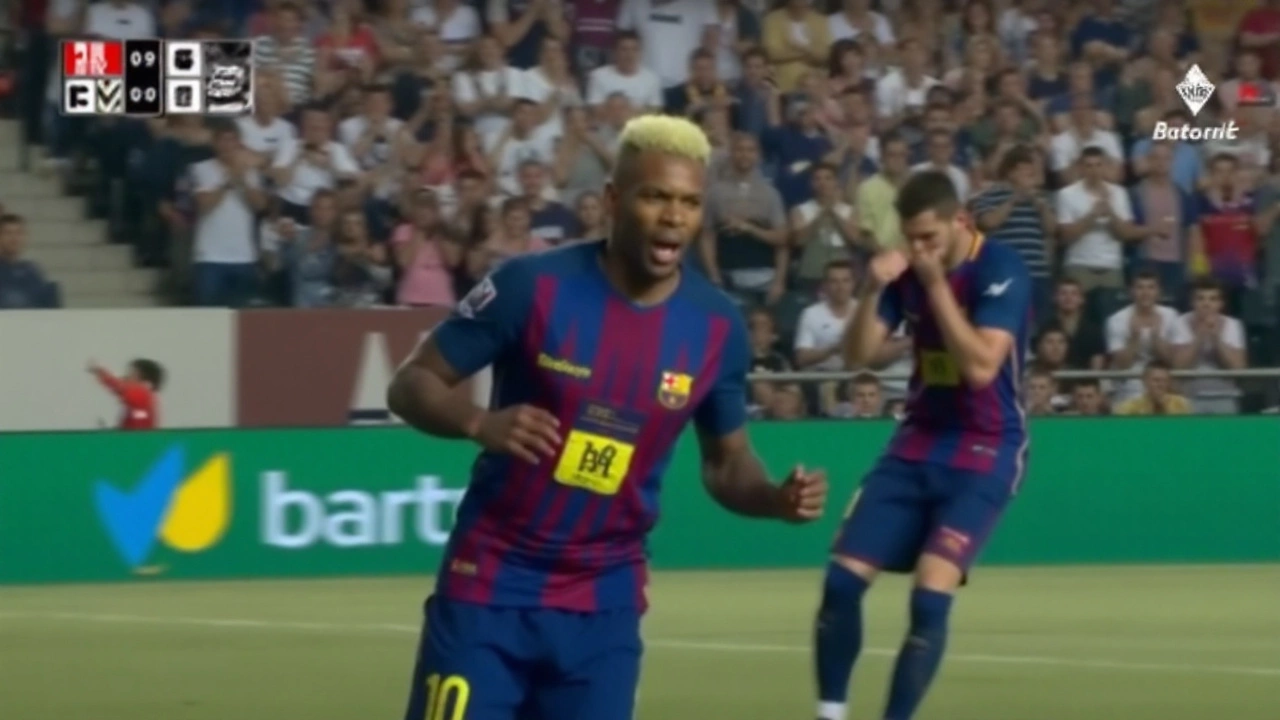No VAR, no comfort at Vallecas. In a noisy, packed house of 14,438, Rayo Vallecano ran at the champions all night and earned a 1-1 draw that felt fully deserved. Referee Mateo Busquets Ferrer oversaw a game shaped by a controversial first-half penalty for Barcelona and a thumping Fran Pérez equalizer that capped Rayo’s relentless approach.
Barcelona’s spotless start to LaLiga is over after two opening wins. They leave Madrid with a point and a few bruises. Rayo, organized and fearless, again showed why Vallecas is a trap for visiting heavyweights.
How the game unfolded
Rayo set the tone early with direct running from Jorge de Frutos, Álvaro García, and Isi Palazón. Their pace pulled Barcelona’s high line into awkward races toward their own goal, and the home side found space repeatedly down both flanks.
The breakthrough, though, came at the other end. In the 40th minute, Lamine Yamal drove into the box and went down under contact from Pep Chavarría. Busquets Ferrer pointed to the spot. With VAR not operational at Estadio de Vallecas, there was no review—just furious protests from Rayo’s players and staff. Yamal, 18 and ice-cold, rolled in the penalty and marked it with a crown gesture for his second goal of the season.
That lead never felt safe. Rayo kept sprinting into the channels, and Barcelona’s goalkeeper Joan García had to stand tall. He produced five key saves, including two in one-on-one situations against De Frutos and full-back Andrei Rațiu, to keep the visitors ahead into the break.
The second half brought more of the same pressure. Eventually, it told. In the 67th minute, Rayo earned a corner, the delivery arced over the near-post pack, and Fran Pérez—left alone at the far post—hammered a first-time volley high past García. Vallecas erupted, and Barcelona had no real complaint; it was the kind of lapse you get when a defense is stretched and switch-off moments creep in.
Chasing a winner, Barcelona turned to the bench: Robert Lewandowski, Ferran Torres, Alejandro Balde, and Dani Olmo all came on. The ideas improved, but the rhythm didn’t. Rayo’s back line held their shape, the midfield screen kept snapping into duels, and those counter lanes stayed open enough to keep Barça honest. Half openings came and went; a decisive chance never really stuck.
Tactics, talking points and what it means
Rayo’s plan was simple and smart: press triggers on wide buildup, jump passing lanes, and punish the space behind a high line. De Frutos launched most of the early alarms, Álvaro García kept dragging defenders into recovery sprints, and Isi Palazón picked the pockets when Barça tried to play through the middle. Every transition forced Barcelona into emergency defending.
Without VAR, the penalty became the night’s flashpoint. LaLiga protocols allow matches to proceed if VAR fails, but that doesn’t soothe tempers. On another night with a replay, the call is checked frame by frame; here, the referee’s view stood. The tension spilled to the touchline and lingered through halftime. It also sharpened Rayo’s edge. The hosts didn’t sulk—they chased the game in waves.
Yamal’s moment matters for a different reason. He’s already a primary outlet in attack, not just a spark. He won the duel, took the responsibility, and finished. The crown celebration was theater, sure, but it also said something about his rising status in a squad that leaned on his directness when the match got messy.
Set pieces decided the points. Barcelona’s corner defense lost its bearings on the equalizer—ball-watching at the near post, no one tracking Pérez at the back stick. Vallecas doesn’t need many invitations; one clean contact can flip the narrative. That’s what happened.
From the bench, the visitors searched for control. Lewandowski offered penalty-box presence; Ferran tried to threaten the channel runs that had been coming the other way all night; Balde gave vertical thrust on the left; Olmo looked for pockets between Rayo’s lines. Rayo answered with their own tweaks, including minutes for captain Óscar Trejo to steady the press and help win fouls when needed. The stalemate held because Rayo’s structure never cracked.
There’s also the Vallecas effect. Recent seasons have shown Barcelona rarely stroll here. The pitch feels tight, the crowd is on top of you, and Rayo play with a tempo that cuts comfort away from big teams. That pattern repeated.
By the numbers on the table, it’s a solid point for Rayo—10th after three matches, and proof their plan scales against elite opposition. For Barcelona, now 4th heading into the international break, it’s a reminder that away days will test their build-up and spacing. Protecting the space behind the defense, especially when full-backs push high, remains a live issue.
What’s next? Recovery, video, and some quiet time to breathe. The defending champions didn’t lose, but the manner of the draw will keep the coaching staff busy. Opponents will copy Rayo’s blueprint: speed wide, vertical balls early, and aggressive pressing on goal-kicks. Barcelona will need cleaner distances between their lines, better rest-defense, and a sharper first press to keep counters from turning into footraces.
The headline says the perfect start is over. The subhead says something else: in a league that punishes small mistakes, and in a stadium that loves chaos, a point can be a warning and a lesson at once.

Write a comment